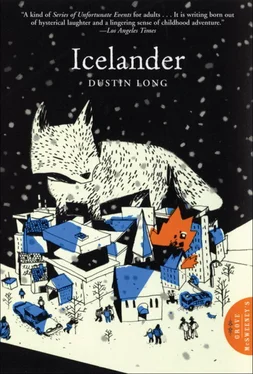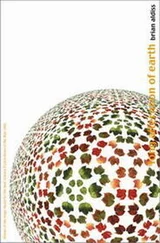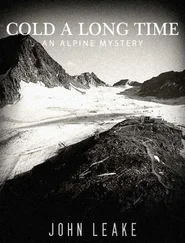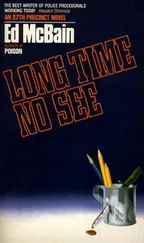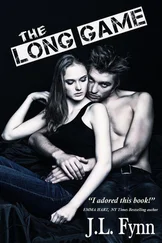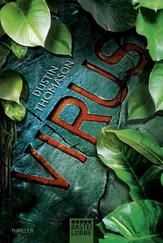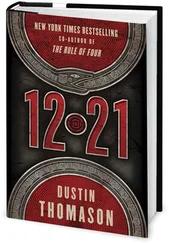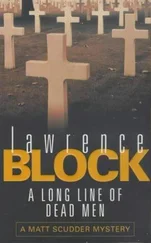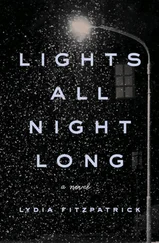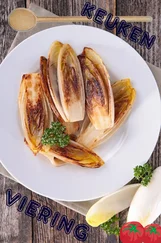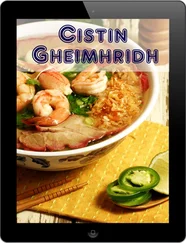“Yeah, okay.”
We walked over together. There was no one inside except a teenage shopgirl reading some Icelandic cine-mag. I don’t know how she managed to make out the words, because the only light came from the fluorescent green tubes lining the ceiling. An imitation of ormolu lichen, I guessed, though it felt more like a spaceship. I just hoped she didn’t recognize me and start screaming and everything. Knowing my luck, I half-expected to see myself on the magazine’s cover.
The son pulled two RC Colas from the refrigerator in the back.
“Do they have any Coke?” I asked.
“Royal Crown is the official soft drink of Vanaheim.” He was paying, so I figured I shouldn’t argue. Then I recalled the reason why he was paying.
“Listen,” I said, picking up some igneous rock that they were trying to sell as a souvenir. “Are you sure your dad and that old guy aren’t gonna just split all my money between themselves?”
“The old man is a topsider. My father and I have no compassion for him or his kind. It shall only cost you sixty dollars, because my father will take great enthusiasm in niggling for you such that the oppressive topsider will obtain no extra money for himself. Of course, my father may extract a small fee for his passionate niggling.”
“Of course.”
The whole Vanaheimic hatred of topside Iceland was just totally strange to me. It was like the old episode of Star Trek where the black-and-white aliens hate the white-and-black aliens. I mean, the language was basically the same, the people all looked pretty similar, and they all lived on the same island, so I just didn’t see what the problem was or why Vanaheim would even care about independence. Still, if it meant that the father would niggle extra hard on my behalf, I guessed I was all for it.
OUR HEROINE
I was so determined in rushing along, myself, that I almost failed to catch my father’s hand when he stumbled stepping down from a curb. All of his books were burnt, I realized, like the neurons in his brain. When he straightened up and stretched himself to his full height, though, I saw him for a moment as he’d been before . Even with his waning mind, I could see him swell with the half-remembered ardor: his hatred of Surt, his love of my mother. His fury and pain when she died.
BLAISE
It is yesterday morning. I have just returned to my home, and I am receiving a call telling me that my wife is dead. What do I do?
How has it happened? Why has it happened? These are not the first thoughts that occur to me. I do not immediately become the investigator. First my face turns pink and bloated, and the red blood flows through the tendrils in my eyeballs. It is a time when I do not deny the water from my eyes.
I hear myself but I do not attend much to what I hear. I am trying to attract my attention, heaving and yelling, and hitting myself in the chest and head. There is more of this, and my hand is bleeding when I again take notice. I have broken the mirror at which my wife would fix her face, framed in tiny bulbs of light as if she were an actress. I turn on the bulbs and bandage my hand with gauze.
Still I do not begin to investigate. I lie on our bed with one of her fuzzy-collared coats upon my head and a large pillow between my legs and another in my arms to feel as if I am holding her. I desire to feel her move against me and to taste her bitter shampoo of which the pillow in my arms still smells. I wish to hear her making funny voices.
It is yesterday afternoon, and I am sitting on our bed with her journals around me and the few letters that she sent me from Denmark. Addressed: My little cabbage .
I am only eager for the shape of her words, and I think not of the meanings they enclose. If my ears cannot have her voice, then my eyes, though weeping, will have her writing. I feel my face contorted and try to hold it together between the covers of one of her journals, my nose pressed into the crack of spine. I do not smell anything. It is some time before I finally begin to read for meaning and, with great wretchedness, become the investigator.
WIBLE & PACHECO
After our encounter with the actor, we followed his trail backward to the source; for the second time that day, our investigation had led us to enter a private domain that was alien from our own. Now the librarian’s store; earlier the home of Our Heroine. One space male, the other female. Opening the shop door, we considered the symmetry of the situation.
Within the store, we were confronted with the meaningless void of darkness. Climbing through Our Heroine’s kitchen window, we had been confronted rather with a noise whose semiotic value was not so easily measured.
Question: Can the bark of a dog be said to “mean” anything? We might, for instance, have reasonably considered the yelps of the dachshund below the window to connote something like “Leave this place, intruders; you are not welcome within these walls.” But the dachshund then being quieted with sausage links offered from our pockets, was it not also reasonable of us to revise our interpretation such that the same yelps were seen to have connoted something more akin to “Strangers, I demand tribute. My voice shall not be stifled until my belly is sated.” Detached from context, the yelps can signify nothing; yet the silence in which they furiously resounded imbued them with more meaning than any response possibly could.
“Hello?” we called then through the gaping shop door. A slight echo was the only response.
OUR HEROINE
The howls of Garm, though not far off, had already ceased when my father fell face-first into the snowbank of the sidewalk.
“Pa, are you all right?” I knelt beside him and tried to turn him over, but he wouldn’t move.
“I am fine, dear thing.” His words were muffled by the dirty snow. “There is nothing for you to worry about. Leave me be.”
“I should have taken you to a hospital.”
“No, no. I need no hospital. I will have no such thing.”
“I need to turn you over, Pa.”
“The snow is cold. It is like clumsy whiteness numbing my face.”
“That’s why I need to turn you over.”
I attempted to roll him again, and this time he allowed me.
“I saw his face,” he sputtered, blowing snow from his lips. I wiped more from his eyes. “Yes, yes, thank you, that is fine. I saw the face of Surt, dear thing, despite much snow in my eyes and my vision blurred.”
“…”
“Emily was there also. She was in danger. We must find her without delay.”
“Oh, Pa, how did you get so bad all of the sudden?”
He snorted derisively. “It is not I who am bad, dear thing. Surt is the bad one, as always. But we have wasted too much time in dallying here while he has time to disguise his handiwork. Let us go.”
He started to get up and I helped him the rest of the way. “All right, Pa, we’re just going to pick up Garm, then we’ll all head home and plan the next step from there, all right?”
“Hmm… Yes, that sounds like a reasonable plan.”
“Hey there, strangers!” At the end of the block Constance Lingus was yelling in our direction.
BLAISE
It is this morning and I have been awake all night, breaking more things and screaming in the empty and otherwise silent bedroom unfilled with Shirley’s snores. I have been scratching at scrawled-over words in Shirley’s journals and musing on the missing pages. My fingernails are blue and my eyes are red. Overheated coffee has numbed my tongue, but I say her name.
She called her coffee “phlogiston.”
I am a fish . This the central line from the Two-Story House, [26] One of the only extant pieces of Shirley MacGuffin’s fiction. More on this later.
I know, but what is it doing here amongst her notes on Denmark? What happened there?
Читать дальше
